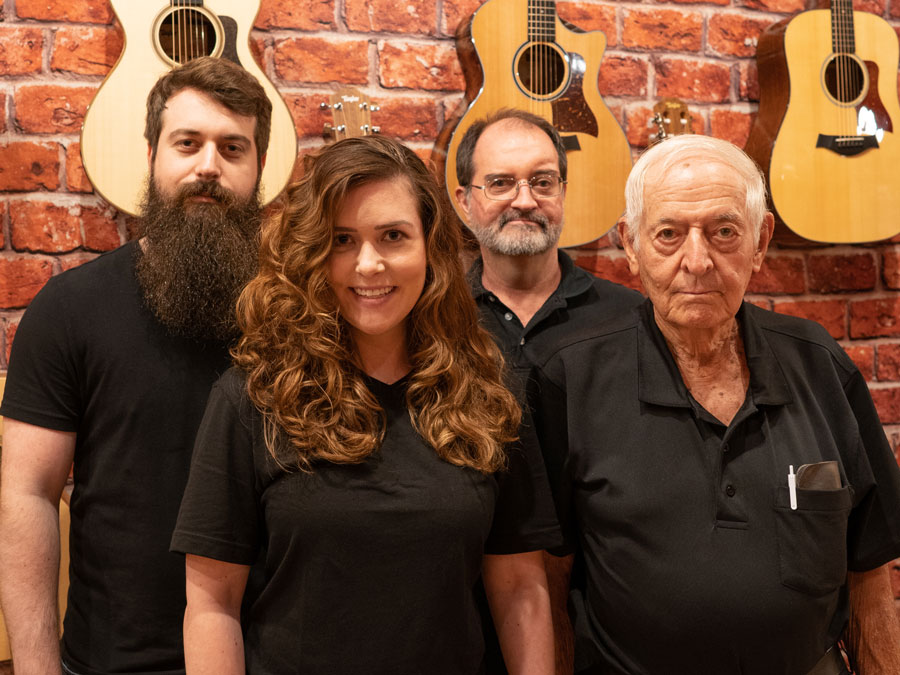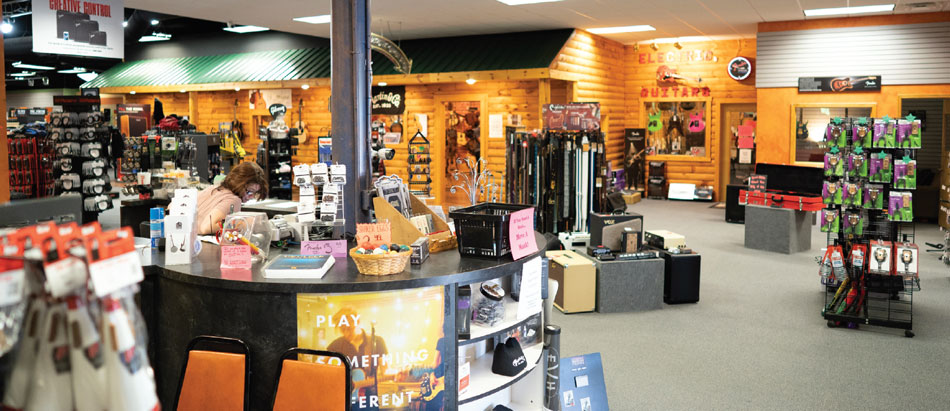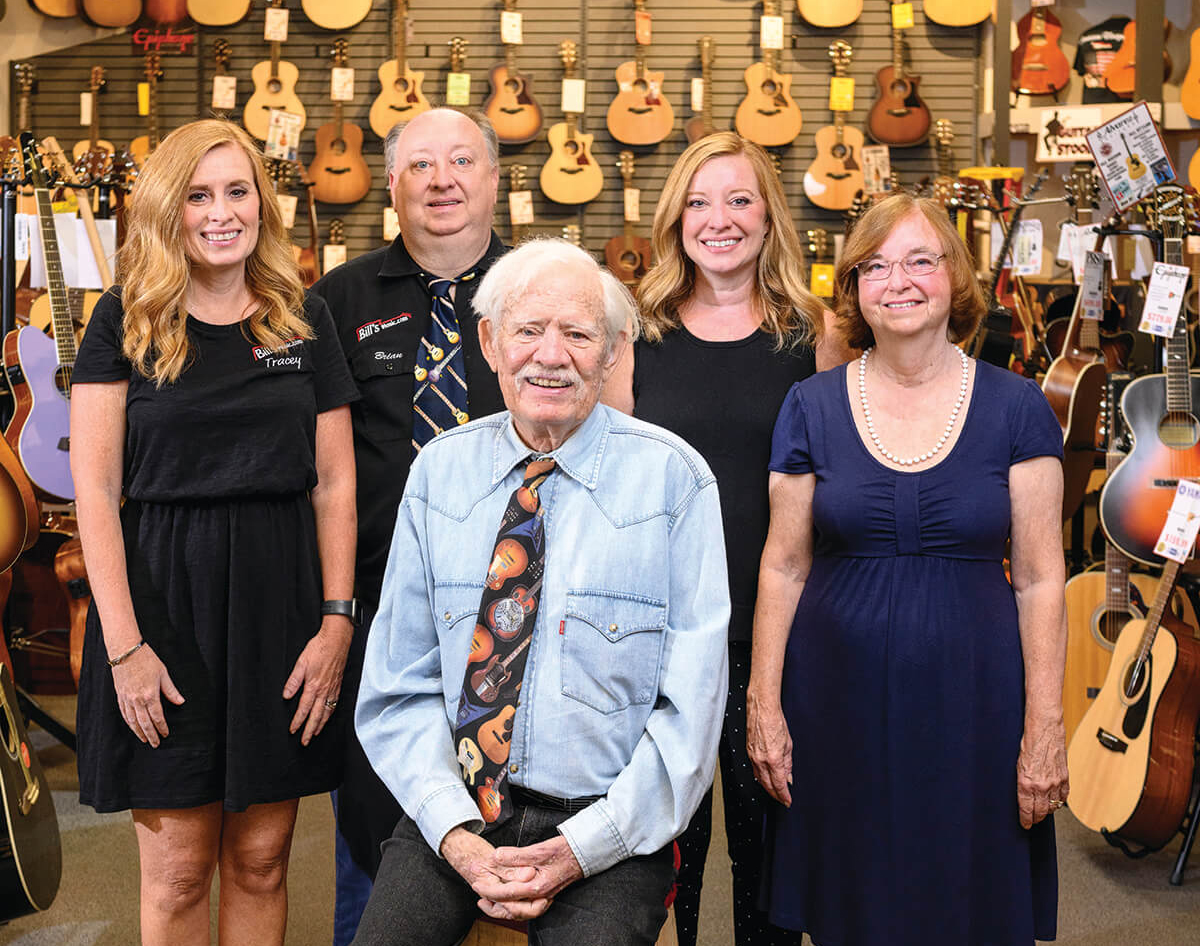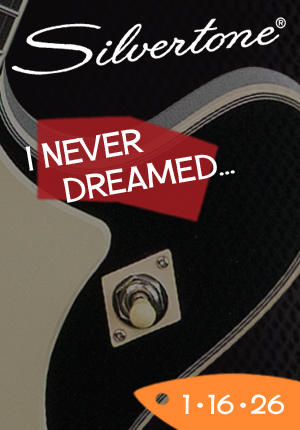
From left: Matt, Melissa, Steve and Pete Ceo of C.A. House Music.
August 11, 2020 I Cover Story
Living Through History
As it approaches 150 years in business, C.A. House Music is still thriving in challenging times.
By Daniel Margolis
For many, the coronavirus and the quarantine that came with it felt like a marathon, but at C.A. House Music it was more like a long sprint. “We ran like crazy for those couple months,” said Melissa Ceo, business development manager for the full-line dealer located in Ohio and West Virginia.
Like so many other retailers, C.A. House Music was forced to close in mid-March. “The first two weeks we only had a skeleton crew in,” Melissa said. “But then it became really difficult for us to keep up with delivery and curbside pickup because we were doing so much with that. It was impossible.”
C.A. House Music realized it needed to bring its staff back, so it divided them into two teams, one of which worked the first half of the week, while the other tackled the second half.
The company pivoted in other ways, setting up a Google Voice number so its employees could be reached wherever they were during normal business hours and going on Facebook Live every day to show off its products. “We saw so many sales from that,” she said.
According to Melissa, reopening to the public on May 12 wasn’t complicated. “It was more [a matter of] getting the word out that we were allowed to have people in the store,” she said. C.A. House Music is following government guidelines on serving the public, wearing masks and, of course, sterilizing instruments more vigilantly than ever. “When people are trying guitars out, we don’t just put those guitars back on the wall,” Melissa said. “We disinfect and sterilize them.”
The company is maintaining social distancing in its stores, but in a way designed to avoid conflict. “If somebody gets too close, we just back away a little bit,” Melissa said. “We try not to make it a huge thing. That opens the door for a potential confrontation, and we don’t want that. We just want to make sure everybody’s safe.”
All of this innovation and care has paid off. Over three months into the pandemic, C.A. House Music is in strong economic health. “Our sales took a little bit of a hit overall, but honestly it was not anywhere near what we were worried about,” she said. “We did really well considering we couldn’t have any customers in the store.”
Nevertheless, the gravity of the situation is not lost on Melissa.
“I never expected to live in a history book,” she said. “This is what my great grandkids are going to interview me about for their history classes.”
The CEO
Yet, C.A. House Music itself is a part of history — the company is nearly 150 years old. Founded in 1872 by Chauncey A. House, C.A. House Music initially sold pianos and reed pump organs in a small store on Market Street in Wheeling, West Virginia.
“He ran the company basically up until his death in 1921,” said Melissa’s father Steve Ceo, vice president and general manager of C.A. House Music. “Then his wife took over, and then after that, a couple of the stockholders took over. [House] had a lot of different affiliates around West Virginia, Ohio and Pennsylvania that he sold through, so it was quite a business at the time.”
In 1964, Pete Ceo, owner of Ceo Music, which specialized mostly in band-and-string instruments and was also located in downtown Wheeling, purchased the controlling stock of the company. “They were located next to each other on Main Street, right at the corner,” Steve said. “Anyone who went [though] downtown Wheeling passed the store. There was no other way to get downtown at the time. So it was a really good location.”
Pete decided to merge the companies. He went with the name C.A. House Music rather than Ceo Music for a simple reason: Customers couldn’t pronounce Ceo. (It’s pronounced “chay-oh.”) “People got confused by the name Ceo Music,” Steve said. “Of course, they always thought of the chief executive officer too. I was on the NAMM board for three years, and the first year I was on it, people would see my name plate and they thought I had put CEO after my first name.”
Today, C.A. House Music has locations in St. Clairsville, Ohio; Parkersburg, West Virginia; Zanesville, Ohio; and Lancaster, Ohio. The St. Clairsville store serves as the company’s home base, housing its offices within its 24,000 square feet. The Parkersburg, West Virginia, location is 10,000 square feet, and the Zanesville, Ohio, location is 7,500 square feet. At 2,800 square feet, the Lancaster store is the smallest and thus not a full-line store, sticking to guitar, band instruments and keyboards.
Forty-seven employees are spread across the four locations (21 in St. Clairsville, 12 in Parkersburg, seven in Zanesville and seven in Lancaster), which all offer lessons through 41 teachers that the company works with as independent contractors instructing approximately 650 students. The company actively partners with 175 schools across the wide geographic area it serves.

Bled Into The Roots
Any music retailer is defined, at least to some extent, by where it’s located and its community. Asked how the musical history of the Ohio Valley and rural Appalachia helped define her company, Melissa immediately pointed to the Wheeling Jamboree. Started in 1933, the Jamboree is the second oldest country music radio broadcast in the U.S. after the Grand Ole Opry. “It was broadcast all the way up to Canada,” she said. “So many people got their start on this radio show.”
The Jamboree was held at the Capitol Theatre in Wheeling, which worked out well for C.A. House Music as it used to be located right across the street, making it a natural stop for musicians. “So, we really have this rich musical history,” Melissa said. “Music has really bled into the roots of the community. There’s just so much music happening here.”
All of this, Melissa pointed out, drives sales. A community invested in music means parents get their children learning instruments, and people in general maintain a lifelong passion for playing music and support their music scene. “Our local high school, Wheeling Park High School, just put in a multi-million dollar theater,” she said. “I did a national tour and it’s nicer than a lot of the theaters that I’ve seen across the U.S., and this is in a high school.”
Recognizing all of this, C.A. House Music returns its customers’ dedication by recognizing their inherent diversity. Some of this diversity simply stems from the company being a full-line dealer.
“The person who is going to be buying a grand piano is not necessarily the same person who is going to be buying a beginner guitar [and] is not necessarily the type of person who’s going to be renting an instrument for their child,” she said.
Meanwhile, C.A. House Music, with its wide geographic reach — from Pittsburgh, Pennsylvania, to the east to Columbus, Ohio, to the west — has range to its character as a retailer. “We’re not just suburban, we’re not just rural, we’re not just city,” Melissa said.
This translates to a customer base that’s not uniform in a lot of ways, including how it receives information. “Not everybody comes from the same walk of life,” she said. “[That] does require us to think outside ourselves. I have good internet, but that doesn’t necessarily mean my customers do, so you have to be able to utilize everything available to you.”
This means C.A. House Music’s marketing efforts can be a bit old school. It’s in the phone book, on billboards, in the newspaper and on local television. It’s doing whatever it takes to reach its customers, internet or not.
Be Yourself
All of this isn’t to say C.A. House Music isn’t active online — it is. Its digital efforts begin with its online store, which Melissa said the company uses as a catalog of its stock, translating to in-store sales. “We used to not have a ton of our products online, but then we realized that we were losing in-store sales because people would come to our website and be like, ‘Oh, well, they don’t have it,’ and then just buy it online,” Melissa said.
The company is also active on Reverb and eBay, using the latter as a clearinghouse for anything that’s been sitting around its stores too long. “It’s definitely our garage sale go-to,” she said.
On social media, C.A. House Music is most active on Instagram and Facebook — in fact it has a Facebook page for each of its locations. Impressively, over 11,000 people like the company’s St. Clairsville location’s page, while the other locations draw between roughly 1,000 to 2,000 per page. “One of the biggest things that we find success with is Facebook ads because you’re able to just target so well,” Melissa said. “It’s all self-report, so it’s not advertisers guessing what the demo is, and you can dial down to what these people’s interests are. It’s a little bit of an older demographic than it used to be, but the thing is, with the younger kids, who’s bankrolling the purchase? A lot of times, it’s the parent.”
Melissa’s advice for other retailers approaching social media is simple — be yourself. “Know what your personality is, your store’s is,” she said. “We’re professional, we’re knowledgeable, but also we are kind of goofy and ridiculous. We have a lot of crazy personalities.”
She also stressed not letting a desire to perfectly execute content on social media stand in the way of engaging with it. “It doesn’t have to be beautifully curated and perfect,” she said. “I just go out on the floor, I take a ridiculous selfie with our guitar manager and we post it.”
Some of C.A. House Music’s social content is more evolved. For example, a video the company posted on its YouTube channel in February asked the question, “What happens when you put acoustic strings on an electric guitar?” (short answer: it’s hard to play and goes out of tune quickly). The video is well-executed in how it’s filmed and edited, and effectively answers the entertaining question it poses.
C.A. House Music’s YouTube channel is the brainchild of Steve’s son and Melissa’s brother Matt Ceo, the company’s social media manager. He took over the YouTube channel two years ago and has since grown it from 600 to over 6,000 subscribers. “My goal with the channel was to really showcase our staff because our staff is pretty wacky and out there and fun, and I really want to showcase their personalities,” he said. “What I’ve found is that people really enjoy watching our staff.”
Matt explained how this drives sales. “When some new guitar or something comes out, we’ll do a video on that, and people hear what it sounds like,” he said. “We’ll talk about how the guitar feels and what it looks like, and then they get really excited to come in and want to try it for themselves.” This leads to purchases in-person and online, as the videos have links to purchase product embedded in their packaging.
Like many stores, C.A. House Music saw a spike in online sales during the coronavirus quarantine, and Matt reports that what’s selling now is surprisingly expensive. “The trend we had been seeing is a higher quantity of lower-end things, but now that’s almost flipped to higher quantities of higher-end things,” he said. “We’re not sure if that’s due to the stimulus or people having a lot of time on their hands and want to upgrade their guitar or what.”
A Dream Job
C.A. House Music has been thriving for a century and a half and spans three generations, something Steve pointed to in assessing where the company may be in the next five to 10 years. “With my two kids in the business, I think it’s headed for a bright future,” he said, adding that he didn’t even have to think about a succession plan for his business. “I really didn’t plan on it. It just fell into place.”
For Melissa’s part in speculating about the company’s future, while she admits that she tends to “live a little too in the moment,” she has an eye on ensuring that C.A. House Music continues to adjust to its current climate, one changing more rapidly than ever these days. “The biggest goal is stay relevant, stay connected with the times, and make sure that we’re serving our customers on the correct platforms and in the way that we always have.”
At the same time, she stressed that people in MI should remain connected to the passions that drew them to music in the first place. “I feel like in the music industry, we sometimes tend to take ourselves too seriously,” Melissa said. “It’s a serious business obviously, [but] I always try to keep in mind where we are, what we do and how fun it is. We get to come to work every day and help people discover and make music. At the end of the day, we have a dream job.” MI











